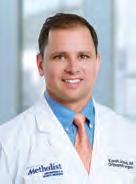LEADING MEDICINE
KNOW YOUR NUMBERS:
How Your Doctor Can Help You Stay in a Healthy Range

Tips for Your Postholiday Health
Defend Yourself Against Colorectal Cancer
WINTER 2023 YOUR
NEWS
FROM
LINK TO HEALTH INNOVATIONS,
AND TIPS
HOUSTON METHODIST
4
6
Health Numbers You Should Know
Find out how your primary care provider helps you stay healthy with preventative personalized care.

Defend Yourself Against Colorectal Cancer
Get to know the signs, preventative tips and ways to reduce your risk.
7
Tips to Get Healthy After the Holidays
Learn more about the health indicators you should talk about with your doctor.
Slow Cooker Cooking: Healthy Meal Tips
Preparing a healthy meal can be time-consuming. And even when you do have some extra time at home, you still don't necessarily have time to stand over your stove or oven — stirring, flipping, sautéing, boiling, simmering — and the list goes on. Enter the slow cooker. Possibly one of the best ways to take the pressure out of cooking a healthy meal that can also feed the whole family, be stored away as a heat-and-serve lunch option during a busy week or simplify your cooking logistics.
HERE'S WHY A SLOW COOKER IS GOOD FOR COOKING HEALTHY

■ Depending on its size, you might be able to cook a well-balanced meal — including protein, carbs, and vegetables — all in the same pot.
■ Because you're typically cooking with broth or other flavorful liquids, a slow cooker is also a great way to keep lean cuts of meat tender and juicy.
■ You can use a slow cooker for batch cooking or meal prep, as well as when you have leftover veggies, beans or meats, and want to make a stew or soup.
INGREDIENT SUBSTITUTIONS THAT CAN MAKE ANY SLOW COOKER RECIPE HEALTHIER
■ Choose whole-grain options over refined carbohydrates.
■ Rinse and drain canned vegetables and beans.
■ Replace mayonnaise with Greek yogurt.
■ Cut the cheese.
■ Add more herbs and less salt.
■ Add extra veggies.
2 LEADING MEDICINE FROM HOUSTON METHODIST IN THIS ISSUE | WINTER 2023
7
Read More Health Tips and Tricks Visit houstonmethodist.org/blog
Finding Relief from Carpal Tunnel Symptoms
With ever-changing technology at our literal fingertips, the repetitive overuse of our hands and wrists at home or work is the new normal. But it can come with consequences.
Carpal tunnel syndrome (CTS) has become one of the most common nerve disorders experienced today. It causes pain, tingling, numbness, and weakness in the hand, wrist and arm. According to the orthopedic surgeons at Houston Methodist Orthopedics & Sports Medicine, with the right proactive measures, it’s usually very treatable.
CTS is caused by repetitive movements of the hand and wrist — either at work or home. It’s also linked to other underlying health conditions, such as diabetes, pregnancy, rheumatoid arthritis or trauma to hands or wrists.
“When your carpal tunnel nerve gets compressed, over time it’s function gets compromised,” explained Dr. Korsh Jafarnia. “Symptoms start with sensory changes, such as numbness and tingling in the fingers.”
HOME REMEDIES
The key to slowing the progression of CTS is being proactive. Take action as soon as you notice symptoms.
“Patients commonly say they wake up in the middle of the night with their hands numb and tingling,” Dr. Evan Collins noted. “Wearing a wrist splint to bed will keep your wrist straight and take pressure off the nerve.”
Other measures that may help ease discomfort include taking ibuprofen, applying ice and having good ergonomics in your workspace.
“Repetitive motions and poor ergonomics can put anyone at risk for developing carpal tunnel,” Dr. Shari Liberman said. “Simple things, such as keeping your keyboard at elbow height and using a mouse pad to avoid bending your wrist can minimize your risk. If you have a

job where you perform repetitive tasks, take frequent breaks and use nerve glide exercises to stretch your hands and wrists.”
TREATMENT OPTIONS
CTS can get worse over time. You should see a specialist if symptoms are disrupting your sleep or daily activities.
If you do not respond to traditional at-home remedies after a few weeks, a steroid (cortisone) injection may help. Steroids decrease inflammation and swelling and provide longer-lasting relief for mild to moderate cases. This injection can be performed in your doctor’s office and the effects can last several weeks to months.

In more severe cases, surgery may be your best option. “The best treatment for moderate to severe cases is a surgical procedure that relieves pressure on your nerve,” Dr. Todd Siff said. Houston Methodist offers both minimally invasive endoscopic and traditional open surgery for carpal tunnel. Both options are safe and very common, with similar longterm outcomes.



“ The endoscopic procedure is done through a tiny incision in the wrist,” Jafarnia explained. “I’ve found that the minimally invasive, endoscopic option is very comfortable for patients, allowing them to have less pain in the short term and get back to work and daily activities very quickly.” •org/ orthopedics or call 713.790.3333 to schedule an
Schedule an Appointment
If carpal tunnel syndrome symptoms are disrupting your sleep or daily activities, the hand and wrist specialists at Houston Methodist Orthopedics & Sports Medicine are ready to help you find relief. Visit houstonmethodist.org/ orthopedics or call 713.790.3333 to schedule an appointment.
CHECK OUT OUR DIGITAL MAGAZINE AT HOUSTONMETHODIST.ORG/NEWSROOM/NEWSLETTERS 3
Dr. Korsh Jafarnia
Dr. Shari Liberman
Dr. Todd Siff
Dr. Evan Collins
HEALTH NUMBERS YOU SHOULD KNOW How Your Doctor Helps You Stay Healthy


Your primary care provider, or PCP, is one of your most important health resources. But what does a PCP do?
“A primary care provider is typically a physician trained in internal medicine or family medicine; however, nurse practitioners or physician assistants can also provide primary care,” explained Dr. Georgia McLendon, a primary care provider at Houston Methodist Primary Care Group in Southside Place. “Your PCP should serve as your first point of contact for most health-related issues.”
Your PCP helps you understand your individual health risks. They closely monitor your overall health and can recommend additional testing when it , s needed.
“Above all, we strive to develop a long-term, trusting partnership with our patients,” McLendon said. “Working with your PCP can help you become the best version of yourself, mentally and physically, so that you can continue to live the lif e you love.”
IMPORTANT NUMBERS TO KNOW
Heart disease is the leading cause of death in both men and
women in the U.S. By understanding your health numbers, you can reduce your risk of developing cardiovascular disease as well as other conditions, such as stroke, diabetes and obesity. Key health numbers include:
■ Blood Pressure: A measurement of the amount of force your heart needs to pump blood throughout your body. Blood pressure is measured by two numbers: systolic (when your heart pumps blood out) and diastolic (when your heart rests between beats).
✓ Healthy target: less than 120/80 mmHg
Risks: High blood pressure can negatively affect the function of your heart and other major organs, such as the kidney and brain. It’s also the leading cause of stroke.
■ Body Mass Index: A measure of your weight divided by your height, squared.
✓ Healthy target: 18.5 to 25 kg/m 2
Risks: The higher your BMI, the greater your risk of heart disease, high blood pressure, type 2 diabetes and certain cancers.
4 LEADING MEDICINE FROM HOUSTON METHODIST
Dr. Georgia McLendon
■ Fasting Blood Sugar: A measure of the amount of glucose in your blood after fasting for eight to 12 hours.
✓ Healthy target: below 100 mg/dL
Risks: Also called hyperglycemia, high blood sugar can damage the blood vessels and nerves that control your heart over time. It can also lead to type 2 diabetes.
■ Total Cholesterol: A measurement of cholesterol (a fat-like substance made in the liver and found in foods) in your blood.
✓ Healthy target: less than 200 mg/dL. Talk to your doctor to understand all of your cholesterol (lipid) levels, including LDL, HDL and triglycerides, and what they mean for your heart health.
Risks: Excess cholesterol can build up in the walls of the arteries, leading to narrowing or blockages in your vessels, which increases your risk of heart attack or stroke.
GET TO KNOW YOUR CARE TEAM
Chances are you may have seen a nurse practitioner (NP) or physician assistant (PA) during a doctor’s office visit sometime in your lifetime. While they are not medical doctors, these highly trained health care providers work hand in hand with physicians as part of your health care team.
These providers have the expertise to diagnose and treat patients in a variety of specialties. They undergo years of medical training — in fact, most have a master’s degree or a doctorate. Working under the supervision of your doctor, PAs and NPs perform clinical exams, diagnose and treat illnesses, order labs and tests, and prescribe medications. Houston Methodist is home to dozens of such providers, who provide expert, compassionate care throughout the system.
Make an Appointment With a Primary Care Provider
Houston Methodist provides primary care that’s personalized for you and your unique needs.
To find a primary care provider or make an appointment, visit houstonmethodist.org/pcg/ central or call 713.441.7965
S ome risk factors are genetic or out of your control, such as family history, age and sex — but there’s still a lot you can do to keep your numbers in a healthy range.
HOW YOUR PCP CAN HELP
The best way to keep track of numbers and understand how they impact your health is to visit your PCP. As your health partner, they can perform or order tests to check these important measurements and help you make a personalized plan to get back within healthy range if necessary. Plans can include increasing your activity level, adopting healthy eating habits, quitting smoking, limiting alcohol and learning how to check and manage your blood pressure.
Building a partnership with your PCP and working with them to know and manage your numbers can dramatically reduce your risk of heart disease and other conditions. •
YOUR HEALTH by the numbers
For these key measurements, keeping your results within these healthy ranges will go a long way toward maintaining your best heart health.
Blood Pressure: Less than 120/80 mmHg
Body Mass Index: 18.5 to 25 kg/m2
Fasting Blood Sugar: 80 to 99 mg/dL
Total Cholesterol: Less than 200 mg/dL
Talk with your primary care provider about these important tests and steps you can take to get back in a healthy range. If you have diabetes or other health conditions, your goal numbers may vary.
HOUSTONMETHODIST.ORG 5
DEFEND YOURSELF AGAINST Colorectal Cancer
Cancer of the colon or rectum — commonly called colorectal cancer — is the second leading cause of cancer-related death, but preventative screenings have helped the number of cancer cases decrease since the 1980s.
“The key to protecting yourself is being proactive,” Dr. Monisha Singh, medical oncologist at Houston Methodist Hospital, explained. “If colorectal cancer is caught early, it has a much higher survival rate.”

HOW IT DEVELOPS
Colorectal cancer attacks the large intestine — the long digestive organ that removes solid waste from the body. The majority of colorectal cancers start as polyps.
“Polyps are small clumps of cells that form on the inside of the colon,” Singh explained. “Whether a polyp will turn into cancer
DON’T IGNORE THESE SIGNS
Don’t overlook the warning signs of colorectal cancer. If you experience any of these symptoms, see your doctor right away.
■ Abdominal pain, bloating or cramps
■ Bright red or black stool
■ Changes in bowel habits such as new constipation or diarrhea
■ Exhaustion
■ Unexplained weight loss
When it comes to colorectal cancer, early detection is key. Make an appointment for a colorectal cancer screening at houstonmethodist.org/cancer/ colorectal-cancer or call 713.790.2700
depends on its type and size.” Simply identifying and removing them before they become cancerous usually prevents the disease.
SCREENING IS VITAL
The American Cancer Society recommends most individuals begin screening around age 45. “Unfortunately, about one-third of people over 45 have never been screened,” Singh noted. “If you are at higher risk or have a family history of colorectal cancer, you should start earlier.”
There are several types of screening tests available. Talk to your doctor about which option is best for you and your screening schedule. Screening options include:
■ Colonoscopy, while under sedation, a scope is used to examine the inside of your colon and look for polyps or any other abnormalities.
■ Stool DNA test, a sample of your stool will be examined for genetic mutations and blood products in the stool.
■ CT colonography (virtual colonoscopy), X-rays and a CT scan are used to make pictures of the inside of the colon and rectum.
■ Fecal immunochemical test (FIT) or guaiac-based fecal occult blood test (gFOBT), a sample of your stool will be examined for hidden blood.
■ Flexible sigmoidoscopy, much like a colonoscopy, doctors use a device to examine inside the rectum and lower colon.
REDUCE YOUR RISK
The following lifestyle changes can help lower your risk of colorectal cancer:

■ Eat low-fat meals rich in fruits and vegetables.
■ Exercise regularly.
■ Limit alcohol to one drink daily for women and two for men.
■ Maintain a healthy weight.
■ Quit smoking.
Experts also say don’t overlook dietary fiber. “A high-fiber diet can greatly reduce the risk of colorectal cancer,” Singh said. “You should follow a well-balanced diet that consists of fiber-rich foods, like whole grain products, fruits, vegetables, legumes, nuts and seeds.” •
6 LEADING MEDICINE FROM HOUSTON METHODIST LEADING FROM METHODIST
Dr. Monisha Singh
Schedule Your Screening Today
TIPS TO GET HEALTHY AFTER THE HOLIDAYS
For many people, the holidays are a wonderful time of reconnecting with family and celebrating life’s pleasures. As the holiday season ends, many focus on improving their health in the new year through weight loss and exercise.

“People need to understand that losing weight is really difficult,” said Dr. Vadim Sherman, a bariatric surgeon at Houston Methodist Hospital. “Very little of obesity is willpower. It is genetically hardwired from a time when our ancestors faced starvation every day.”
With that in mind, Sherman offered tips for getting healthy after the holidays.
STOP BAD HABITS IN THEIR TRACKS
To change unhealthy habits, Sherman recommends taking a cognitive behavioral therapy (CBT) approach. “The idea behind cognitive behavioral therapy is to help you become aware of your desires and thoughts before they turn into unhealthy actions,” he explained.
B eing aware of our “mindless” habits, especially when it comes to eating, can be the first step the changing them. Once you’ve identified and named the thoughts and patterns that drive you to eat unhealthy foods, make a plan to interrupt those patterns before they occur.
Sherman suggested posting a list of “smart swaps,” on the fridge to remind yourself to reach for an apple instead of potato chips, for instance.
BUILD A HEALTHY LIFESTYLE
Getting healthy is about more than losing weight. In fact, said Sherman, losing weight should be a beneficial side effect of becoming healthier. “Anybody can benefit from healthy lifestyle habits,” he said, “and, if those habits lead to weight loss, that’s great.”
E xperts recommend getting 300 minutes of exercise per week, or 60 minutes per day for five days. Build a habit of both resistance training and zone 2 cardio, which is maintaining an elevated heart rate (180 minus your age) for about 45 minutes per session. Your exertion level should be low enough so you can still hold a conversation. Walking, running, bicycling and swimming are great cardio exercises.
To help ensure you’re making progress, set SMART goals: Specific, Measurable, Achievable, Relevant and Time bound. For example: briskly walk on treadmill for 45 minutes, five days per week, for the next 30 days.
If your efforts to get healthy at home are unsuccessful, you may benefit from talking with an expert. Our weight loss specialists can help with lifestyle changes and recommend methods, such as medications and surgeries that could aid you in achieving your health goals. •
FOLLOW THESE HEALTHY HABITS
There’s a lot of bad information online, and fad diets can harm your health more than they help.
To begin your healthy lifestyle, Dr. Vadin Sherman recommends the following:

■ Avoid processed foods.
■ Don’t count calories.
■ Eat more plant-based foods, such as fruits, vegetables, beans and lentils.
■ Emphasize fiber in your diet, instead of protein.
■ Make water your beverage of choice.
■ Remain active throughout the day.
Talk With a Weight Loss Specialist
HOUSTONMETHODIST.ORG 7
Dr. Vadim Sherman
Visit houstonmethodist.org/weight-management or call 832.667.LOSE (5673) to learn more about your weight loss options at Houston Methodist.















If you prefer to not receive future communication from Houston Methodist, please email optout@houstonmethodist.org or call 713.790.3333 IMAGES MAY BE FROM ©GETTY AND/OR ©HOUSTON METHODIST. LEADING MEDICINE IN GREATER HOUSTON 7 1 3.790.3599 HOUSTONMETHODIST.ORG Houston Methodist Hospital 6565 Fannin St. Houston, TX 77030-2707 houstonmethodist.org NON PROFIT ORG. US POSTAGE PAID HOUSTON, TX PERMIT NO. 4126 houstonmethodist.org/care-options Houston Methodist offers quick access to high-quality care — so you can feel be er now. Feeling under the weather? If you’re suffering from the flu, a cold, a skin rash or even pink eye, we are here for you with a variety of ways to get care quickly, including: VIRTUAL URGENT CARE 24/7 on-demand video visits through the MyMethodist app SAME DAY CLINICS Same-day sick visits for many common health conditions PRIMARY CARE GROUP Quick access to primary care doctors for existing patients Feeling sick? GET CARE NOW houstonmethodist.org/care-options Houston Methodist offers quick access to high-quality care — so you can feel be er now. Feeling under the weather? If you’re suffering from the flu, a cold, a skin rash or even pink eye, we are here for you with a variety of ways to get care quickly, including: VIRTUAL URGENT CARE 24/7 on-demand video visits through the MyMethodist app SAME DAY CLINICS Same-day sick visits for many common health conditions PRIMARY CARE GROUP Quick access to primary care doctors for existing patients Feeling sick? GET CARE NOW facebook.com/houstonmethodist twitter.com/methodisthosp youtube.com/methodisthospitalhou houstonmethodist.org/blog instagram.com/houstonmethodist





























